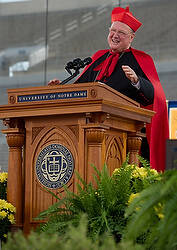Commencement season is almost here, and for Catholic colleges and universities, this can get a little tricky. A Catholic school must find a speaker who (1) offers something wise or inspiring; (2) generates excitement and rouses seniors from the haze of commencement week revelry; and (3) does not advocate positions or beliefs that ought not to be promoted or tolerated in a Catholic institution, particularly at a graduation ceremony.
It's that third element which becomes the most controversial. In their June 2004 statement Catholics in Political Life, the U.S. Bishops teach, "The Catholic community and Catholic institutions should not honor those who act in defiance of our fundamental moral principles. They should not be given awards, honors or platforms which would suggest support for their actions."
As we've seen over the past few years, it's not always clear what that language means in practice. What kind of awards, honors, or platforms "suggest support" for prohibited or sinful actions? Can a college or university distance itself from the more problematic viewpoints of a speaker? What constitutes a "platform"? Is a commencement ceremony an "honor"? Last year, John Garvey, President of the Catholic University of America, wrote, "The thing about honorary degrees, medals, and endowed lectures, however, is that -- unlike the simple permission (or even invitation) to speak in an open forum -- they seem to indicate endorsement of the recipient's beliefs or policies."
What do you think of commencement speeches? Are they outdated and meaningless, or can they play a constructive role? What are some of your favorite commencement speeches? Here are some of the commencement speakers coming to Catholic campuses (many have yet to be announced), which demonstrates quite a mix in interests, backgrounds, and politics:
Ave Maria University: James Hadley Billington, Librarian of Congress
College of the Holy Cross: Jon Favreau (Holy Cross Class of 2003), former director of speechwriting for President Obama
Catholic University of America: Philip Rivers, Quarterback of the San Diego Chargers
Duquesne University: Ed Fritzky, President and CEO, Immunex Corp.
Loyola University Maryland: Mark K. Shriver, Senior Vice President of Save the Children (son of Sargent Shriver)
Marquette University: Fr. James Martin, S.J.
Mount Saint Mary's College: Dr. Maryann Cusimano Love, professor of international relations, Catholic University of America
Saint Anselm College: Bob Schieffer, anchor and moderator of CBS News' "Face the Nation"
Santa Clara University: Brandi Chastain (Santa Clara Class of 1991); soccer player
Stonehill College: Michael Sheehan, CEO of the Boston Globe
University of Dallas: George Weigel
University of Notre Dame: Christopher Patten (Lord Patten of Barnes), Chancellor of Oxford University
Villanova University: Senator Pat Toomey of Pennsylvania








